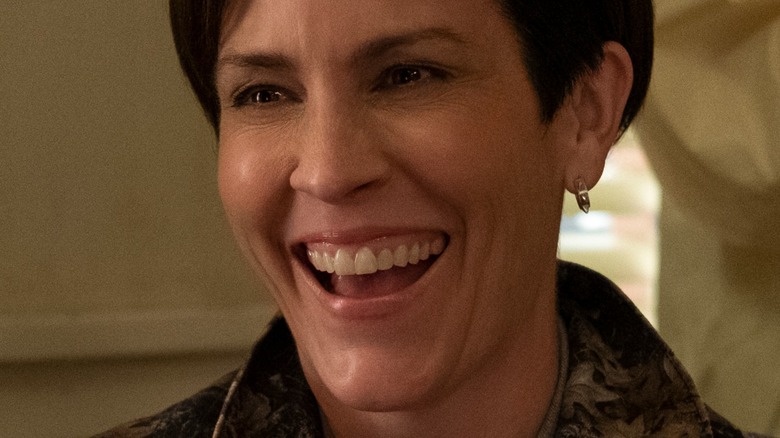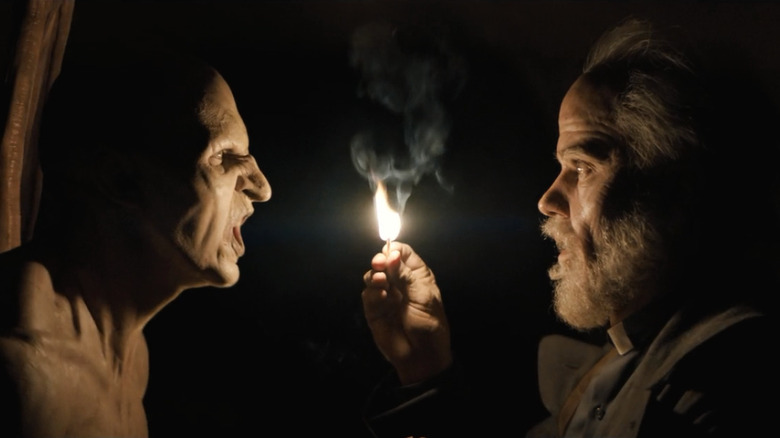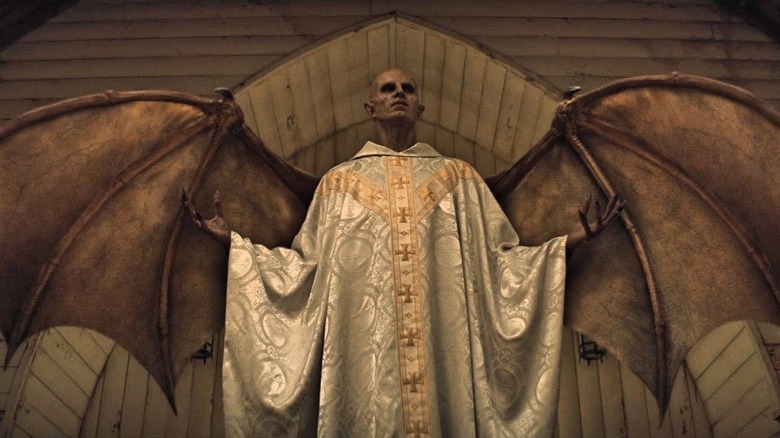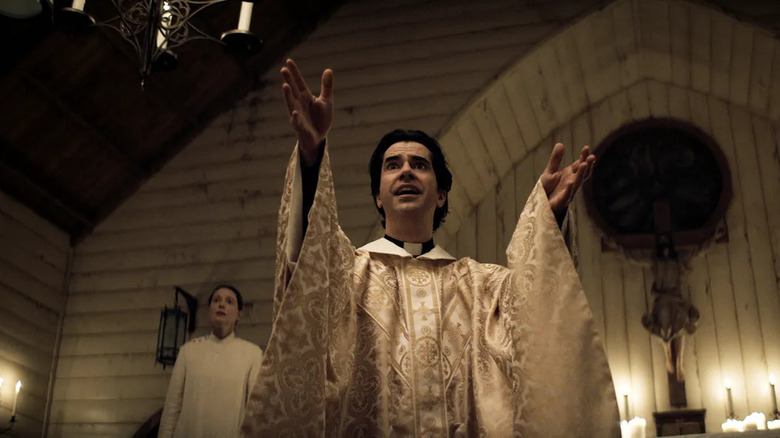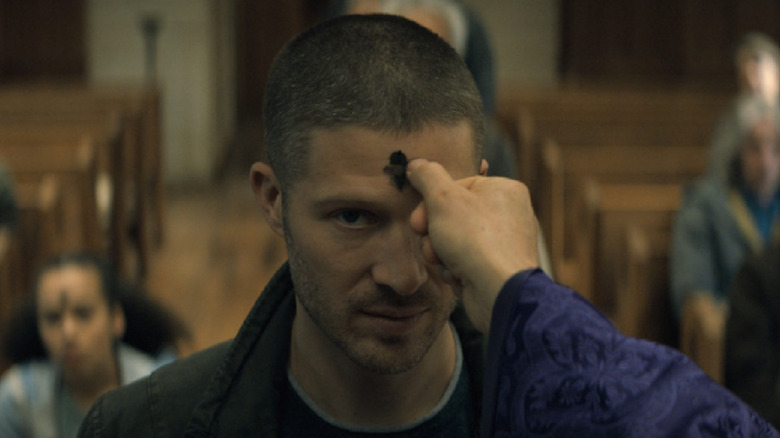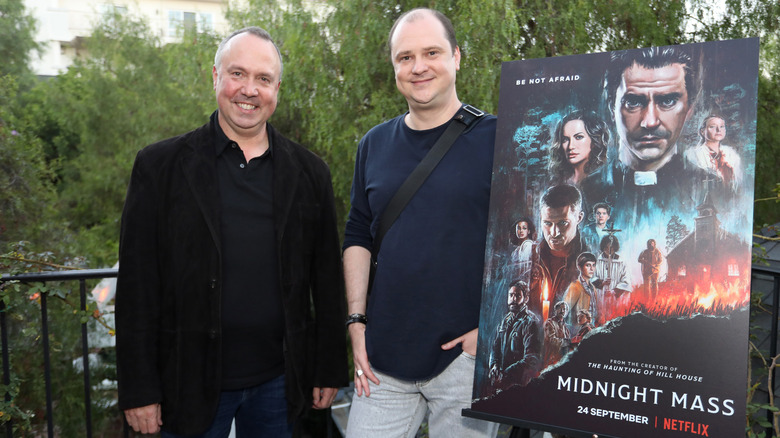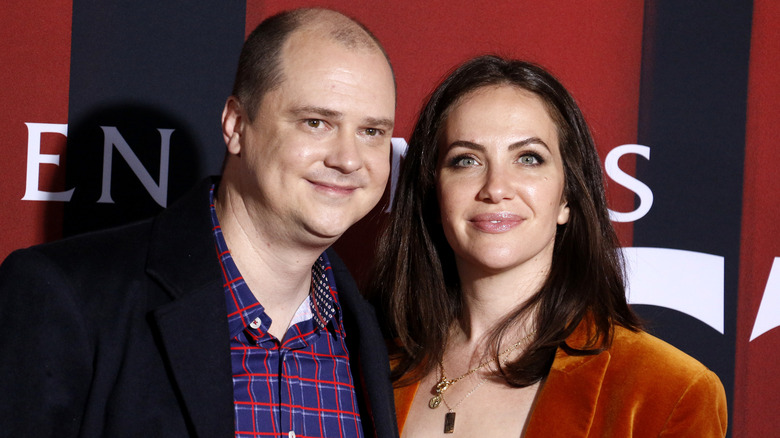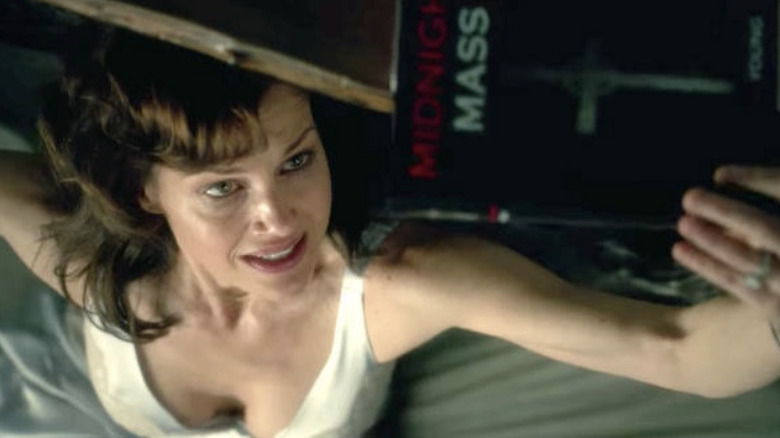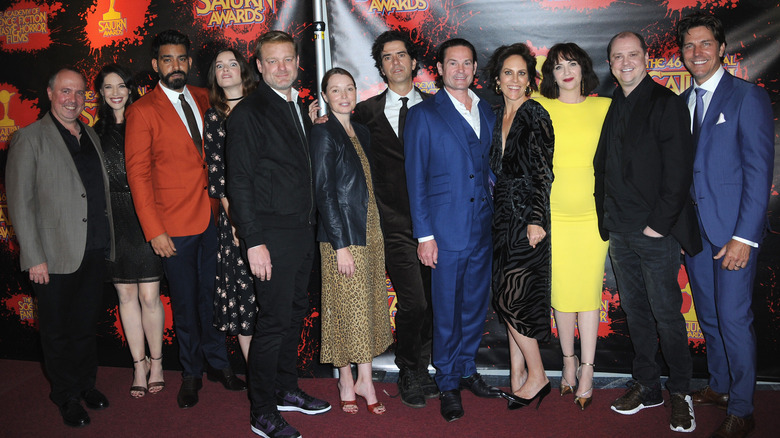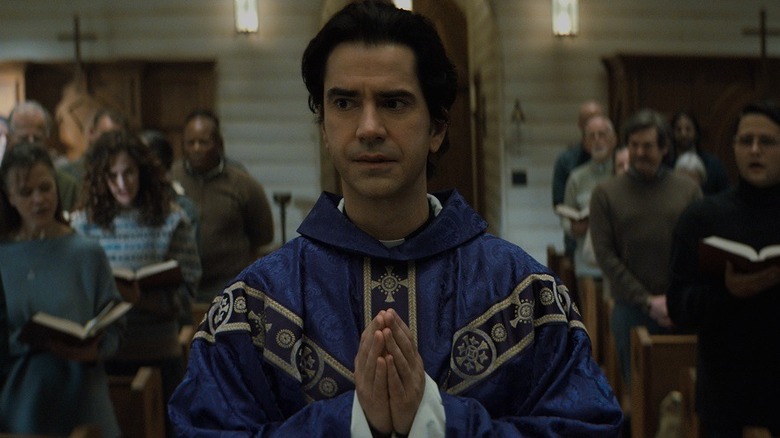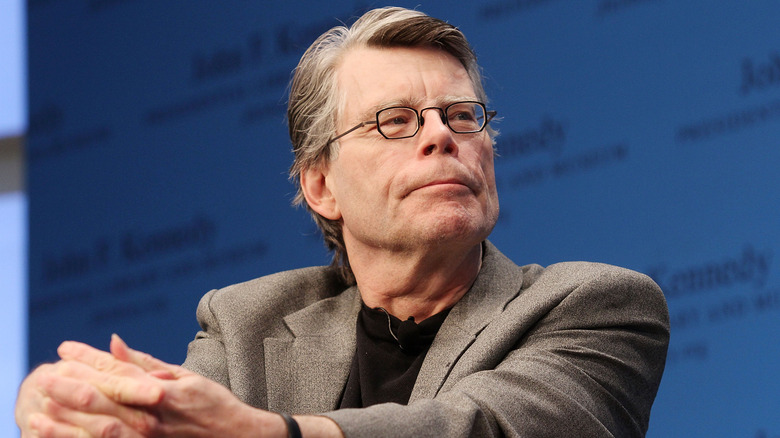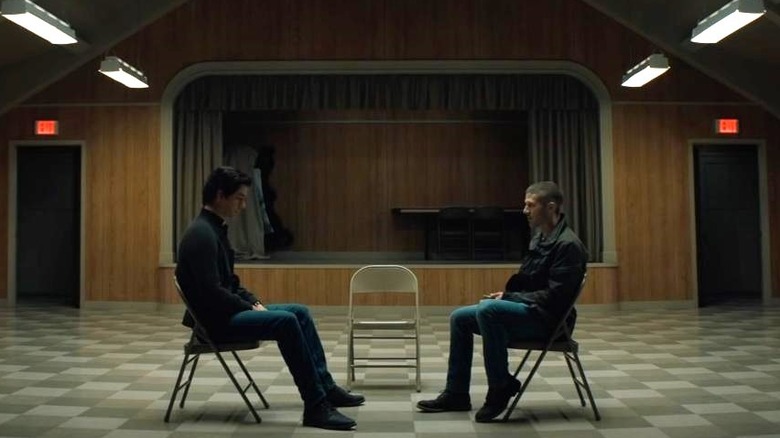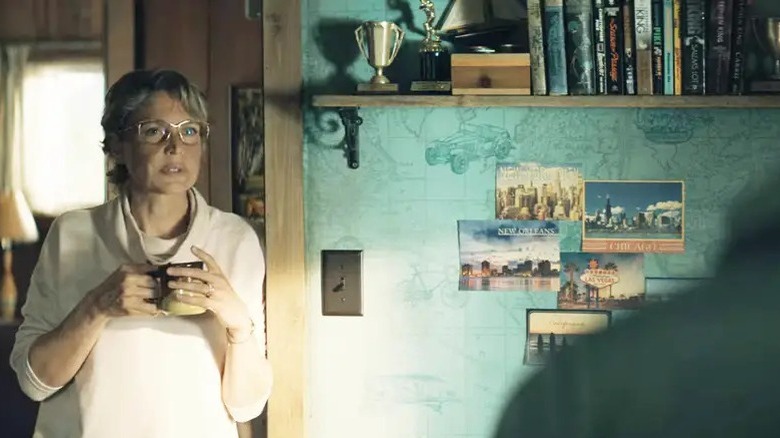Midnight Mass Facts Only True Mike Flanagan Fans Know
"Midnight Mass" is a twisted tale spawned from the dark psyche of horror's hottest director, Mike Flanagan. The highly anticipated follow-up to his work on "The Haunting of Hill House" and "The Haunting of Bly Manor," this new story gifts viewers with one more binge-worthy miniseries to add to their list of Flanagan favorites.
While his anthology installments focus on spirits, forgotten memories, and people long past who cling to the places they once called home, "Midnight Mass" takes a different approach to haunting. It tells a new story, not of ghosts and houses but of monsters and demons that prey upon a town drowning in its own tortured history. The demons of "Midnight Mass" do take on real, material forms as ghoulish, blood-sucking vampires, but in typical Flanagan fashion, they're also symbolic, representing depression, addiction, sickness, religious trauma, and mass hysteria.
The religious omens of "Midnight Mass" warn viewers not to worship false idols, but Mike Flanagan is anything but. From feature films like "Hush," "Gerald's Game," and "Doctor Sleep" to shows like "The Midnight Club," he's the Da Vinci of horror, constantly churning out brilliant works of terror to trouble one's sleep. "Midnight Mass" is no different, as it is a bone-chilling series that viewers take with them long after they've shut off their screens. However, even for those that have binged the series two times over, there's still much left to learn. Here's everything even die-hard Flanagan fans might not know about the series.
Midnight Mass was the first full series directed by Flanagan since The Haunting of Hill House
While the first installment of Mike Flanagan's "The Haunting" anthology series, "The Haunting of Hill House" was fully created and directed by Flanagan himself, the second installment, "The Haunting of Bly Manor," was not a solo project. While he did create the series, he only directed the first episode, "The Great Good Place." The rest of the episodes were directed by a range of others, including Ciarán Foy, Liam Gavin, Yolanda Ramke, Ben Howling, Axelle Carolyn, and E. L. Katz. This means that "Midnight Mass" was the first full series Flanagan had directed on his own since his work on "The Haunting of Hill House" three years prior.
In addition, "Midnight Mass" was also his first major original project since his 2016 film, "Hush," since both installments of "The Haunting" series were novel adaptations. "The Haunting of Hill House" was loosely adapted from the similarly named 1959 Shirley Jackson novel, and "The Haunting of Bly Manor" was adapted from Henry James' 1898 novel "The Turn of the Screw" — with some ideas borrowed from James's other works. Midnight Mass, however, is an adaptation of nothing and is derived directly from the mind of Flanagan himself.
Flanagan wanted Midnight Mass to subvert classic horror tropes
Father Paul's character goes through drastic changes as the series progresses. We see him first as a well-intentioned Christian man who just wants to help the world, only to devolve into a vampirish monster. However, this development isn't necessarily a straight line but rather two extremes co-existing at once.
When discussing his inspirations for the take on vampires in the series, Flanagan explained that "Nosferatu," "From Dusk Till Dawn," and "Salem's Lot" all provided inspiration. However, Flanagan told Daily Dead that he enjoys that this specific horror movie trope is not set in stone. "The thing that I love about the vampire as a cinematic tool is how malleable it is. We all agree that there's no canon, there are no rules."
We see this play out in "Midnight Mass" in the presentation of Father Paul as a priest turned vampire who does terrible things but isn't necessarily evil himself, simultaneously subverting both classic cinema tropes at once. Flanagan explained, "Evil people are very rare ... It was fun to not just do the evil priest or the Leland Gaunt." A new approach helped Flanigan discover a unique angle for the series. "And when it became clear that Father Paul could still do all of the horrible things I needed him to for the story while being a good person with a pure motive, then I felt like we had a show that was about something."
Flanagan drew on his religious expertise to inspire the series' Biblical imagery
The religious themes coursing through the veins of "Midnight Mass" aren't necessarily subtext, as they're extremely blatant throughout the series and embedded in the title of the show itself. It's no secret that the Bible is the primary source material being referenced here, as its text is quite literally quoted word for word at many points.
What some viewers might not know, however, is that Flanagan not only borrowed from the Bible, he's actually extremely well-versed in the text. In an interview with Daily Dead, "Midnight Mass" producer Trevor Macy practically called Flanagan an expert on the subject, "It is literally impossible to overstate how well Mike knows the Bible."
Flanagan followed up Macy's comments by elaborating on this familiarity, explaining that he had been exposed to and fascinated by the more ominous themes engrained in the Bible since he was a child in church. "When I was a kid and in Bible study, the horror elements embedded in the Bible are impossible to ignore ... You've got demons, you've got talking serpents, you've got people being torn apart, tortured. It's all there. The Bible is a blood-soaked text," Flanagan explained.
Flanagan modeled the character of Riley after himself
Mike Flanagan took to Twitter to share what it was about "Midnight Mass" that made the project so personal to him. He emphasized how he, like Riley, was also an altar boy, though he attended the real Our Lady Star of the Sea in Governors Island, New York, rather than the fictional St. Patrick's on Crockett Island. As two altar boys from small towns, it's not hard to see the similarities between them.
Flanagan also opened up in one interview with Nightmarish Conjurings to divulge something even deeper connecting the two men — their struggle with alcohol and addiction. The show follows Riley, a recovering alcoholic, as he returns home to his small town following a prison sentence for drunk driving and manslaughter. "The show opens with anxiety that I think represented my biggest fear about my alcoholism ... it wasn't that I would die in a horrible drunk driving accident, instead, I would kill someone else and live."
Flanagan also discussed the complicated role that religion can play in getting sober, especially since he, like Riley, was far from the firm believer he had once been as a boy in church, "One of the things that struck me as I first tried to get sober was how integrated religion was with AA. ... It's a tricky thing to navigate." Two former altar boys turned recovering addicts struggling with their faith, Flanagan and Riley are one and the same.
Flanagan had been working on Midnight Mass years
With Biblical themes tickling Flanagan's imagination since adolescence, ideas for "Midnight Mass" had been maturing in the pools of his consciousness for years. In fact, Flanagan had been gathering ideas for the series a decade before it ever appeared in our Netflix queues.
At first, Flanagan thought of it as a book and then possibly a movie. "Midnight Mass " producer Trevor Macy told Entertainment Weekly that the series just wasn't right for those formats, however. Ultimately, there was just too much story to tell — an early draft of the first two acts was over 150 pages, leading Flanagan to revisit the idea as a series. There was also a problem with interest, though, as the creators brought it to multiple networks without finding any buyers. Said Flanagan, "I always thought of this as the best project I would never make."
Fortunately for those who appreciate the brilliance of "Midnight Mass," it took the success of "The Haunting" series convinced Netflix to let Flanagan try his hand at another series. Flanagan told Nightmarish Conjurings it was probably a good thing he had received that initial pushback, given that he hadn't gotten sober yet, "I'm very glad that we didn't make the show then because I don't think I knew enough about what I was talking about to have executed the show properly. It's a very different show with three years of sobriety behind me."
Flanagan is married to Midnight Mass actress Kate Siegel
Kate Siegel isn't just an actress on "Midnight Mass" — she's also Flanagan's wife. As the couple explained to Entertainment Weekly, they met years ago when Siegel went to audition for one of Flanagan's projects. While that film never ended up getting made, she clearly left an impression on Flanagan, because he reached out to her a little while later to audition for a small part in his 2013 film "Oculus." Following their work together on "Oculus," the pair began seeing each other regularly and eventually started dating.
They maintained a romantic relationship while also lending each other a hand professionally, with Flanagan helping to prep Siegel for auditions, and Siegel offering notes on Flanagan's scripts. The two then ventured into their first major project together, brainstorming an idea for and eventually co-writing a movie about a deaf author who's attacked in her home by an invader, which Flanagan fans will recognize as the 2016 film "Hush." Flanagan also directed that film, in which Siegel starred.
Other projects the two have worked on together include "Ouija: Origin of Evil," "Gerald's Game," "The Haunting of Hill House," "The Haunting of Bly Manor" and, of course, "Midnight Mass," all of which Flanagan directed and Siegel acted in. With such an extensive and impressive catalog, these two are the literal definition of a power couple!
Midnight Mass makes an Easter egg appearance in Flanagan's films
In 2016, Flanagan directed and co-wrote "Hush" with Kate Siegel. In the film, Siegel plays a horror novelist whose latest best-seller just so happens to be titled "Midnight Mass." There's also a partially obscured plot summary for the book visible with snippets like "512 souls on sleepy Crocket" and "the church put Riley face to face with a terrifying secret," directly referencing the "Midnight Mass" setting and protagonist. Certain characters, such as Erin and Father Paul, and specific scenes, like Riley's car accident and the angel wings-clipping scene, are also mentioned.
Following "Hush," Flanagan set to work on a film of the Stephen King novel "Gerald's Game." The story follows Jessie, portrayed by actress Carla Gugino, who worked with Flanagan in both installments of "The Haunting" series. Her character's husband chains her to a bed but soon dies, leaving her trapped. On the nightstand next to her sits a copy of "Midnight Mass," which she later throws at a dog that's eating her deceased husband's flesh.
While "Midnight Mass" as an actual series had yet to be made during the production of either of these films, it's clear it was already on Flanagan's mind. Seems like he couldn't help but put it on the big screen when given the opportunity, especially since he didn't know if the project would ever come to fruition on its own.
The Midnight Mass cast had varying knowledge of the scripts
In interviews with Buzzfeed, the actors shared a bit about their introductions to the show. Given her marriage to Flanagan, Kate Siegel obviously had quite a bit of information from the get-go. Annabeth Gish, who had also worked with Siegel and Flanagan on early projects, said Flanagan texted her about the role of Monsignor Pruitt and "hooked" her by sending a few scripts over. Samantha Sloyan, who plays Bev Keane, also said she had a lot of background, though she teased that with Mike, you never know the whole story.
While that's probably true, some definitely knew more than others. Zach Gilford, who plays Riley, the show's protagonist, said that he, unlike the others, had practically no information at all going into auditions, "I had two scenes that were both in the first episode. And besides that, all I knew was Mike's work." Similarly, Kristin Lehman also knew very little while going through the casting process for the role of Annie Flynn. However, after only one audition, she was quickly cast and sent all the scripts.
However, Lehman clarified that everyone on the cast was provided with the scripts for all of the episodes before filming began so that they had an idea of where the series and their particular characters were going. It seems that everyone may have started with varying degrees of knowledge about the project, but they were all caught up soon enough!
Despite filming during the pandemic, the Midnight Mass production had zero COVID delays
When COVID first hit, it seemed like no Hollywood set could go a day without a positive test shutting production down. The "Midnight Mass" crew, however, somehow beat all the odds by shooting the entire series without any interruptions. Flanagan was kind enough to share exactly how he was able to accomplish such a feat in a series of extremely detailed tweets.
They had begun prepping the series in December 2019 and were just about to start filming when news of COVID broke in March and production was halted. However, Flanagan was passionate about the project and wanted to get back to work as soon as possible — though he was initially unsure of how to do that. "There was no playbook. This was completely uncharted territory," Flanagan tweeted.
Despite some hesitance, they resumed prep in July and actually began shooting in mid-August, "By the time certain other productions were getting headlines for 'leading the charge 'and 'reigniting Vancouver production' in early September, we'd already been quietly shooting for several weeks." How did they do it? Flanagan tweeted that it wasn't by praying for a miracle but through a rigorous combination of KN95 masks, face shields, designated interaction zones, plexiglass booths, hand sanitation, and weekly testing that "We did not miss a single day of production, and unlike a lot of other shows, we did not shut down once. Not one time. 83 shooting days, without interruption."
Stephen King was a heavy influence on the series
Flanagan's appreciation for King's work is apparent, having worked with King on adaptations of "Gerald's Game" and "Doctor Sleep." Flanagan was also once set to direct an adaptation of Stephen King's "Revival," though that never panned out. However, he nodded to the book in "Midnight Mass," as Ed Flynn's character is seen reading it in one of the scenes.
"Revival" isn't just featured as an Easter egg but actually shares a lot with the series, as its protagonist is a faith healer and recovering addict (via Nerdist). This holds obvious parallels to the themes of religion and addiction facing Riley's character in "Midnight Mass." The recovering alcoholic running from the demons of his past trope is also shared in several of King's other works, from Jack in "The Shining" and Danny in "Doctor Sleep" to Thad Beaumont in "The Dark Half." There's also the fact that Riley commits vehicular manslaughter, which Billy Halleck does in King's "Thinner."
Lastly, Flanagan borrows heavily from King's "Salem's Lot," a novel about a vampire-infested small town, to which the "Midnight Mass" parallels are obvious. Like with "Revival," Flanagan includes a "Salem's Lot" Easter egg, as the book can be seen on the bookshelf in Riley's childhood bedroom. Unsurprisingly, as the show is indeed a masterpiece, King was flattered by his influence on Flanagan's work and offered the show high praise on Twitter, where he wrote, "Mike Flanagan has created a dense, beautifully photographed terror tale."
The Lasser Glass from Flanagan's Oculus makes an Easter egg appearance
The Lasser Glass is a mirror-type prop introduced to Flanagan fans in the 2013 film "Oculus," but has made appearances in practically every single one of Flanagan's later works. It can be spotted in both "The Haunting of Hill House" and "The Haunting of Bly Manor" series, as well as the films "Ouija: Origin of Evil," "Gerald's Game," and "Doctor Sleep." It also made a more recent return as a prop in the Brightcliffe's basement set of Flanagan's more recent series, "The Midnight Club" — Episode 6, to be exact.
In "Midnight Mass," the Lasser Glass can be spotted in some scenes on the stage of the recreation center where Riley and Father Paul have their AA meetings, "It's behind them in the profile [shots] on stage," Flanagan told Entertainment Weekly. "It's all becoming incredibly convoluted, really connected. That's our goal. I want all of [these projects] to just be a big ball of rubber bands by the time we're done, just impossible to extricate from each other."
Midnight Mass contained some foreshadowing for Flanagan's next project
Speaking of Easter eggs, Flanagan may have hidden a clue in "Midnight Mass" about his next project. Flanagan's series "The Midnight Club" follows the story of a group of teens who meet to share scary stories. However, instead of gathering around a campfire, they meet in the hospice they stay in, as all these teenagers are sick or dying of illness.
Like many of Flanagan's works, the series is adapted from a novel, one that he told Vanity Fair left an impression on him when he was young. Flanagan remembered, "'The Midnight Club' was a particular shock to me as a teenager because I thought I was getting this pulpy little YA novella about a spooky Grim Reaper or something. But no, it was about teenagers having to reconcile with terminal diseases and with death."
The series is based on the Christopher Pike novel of the same name and draws on some of the author's other works, which Flanagan expressed appreciation for. "Some of the first real conversations I had with my contemporaries about death and love and sex and alcohol and drugs and all the rest of it came from the fact that we were reading Pike books," Flanagan explained. Some of these books are on Riley's bookshelf in "Midnight Mass." Whether plans to adapt the series were already underway or Flanagan just included some of his favorite books as props remains unclear, but they're there!
